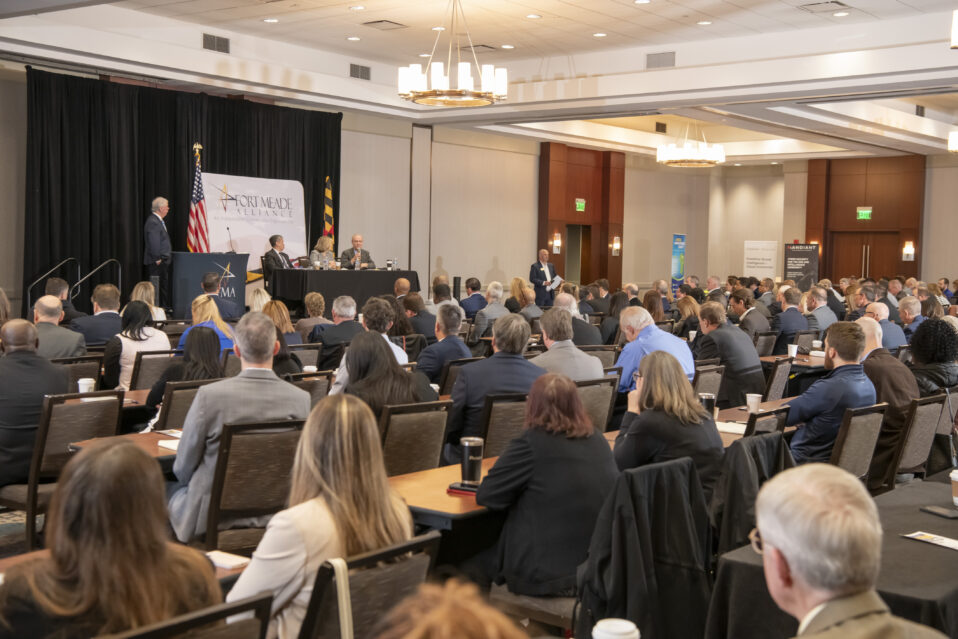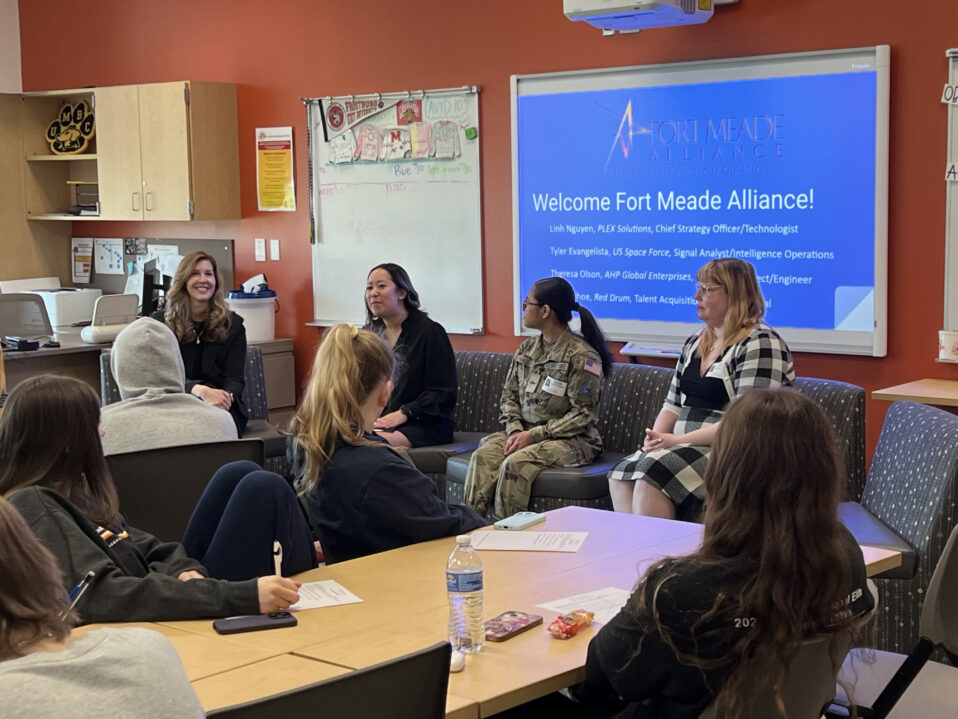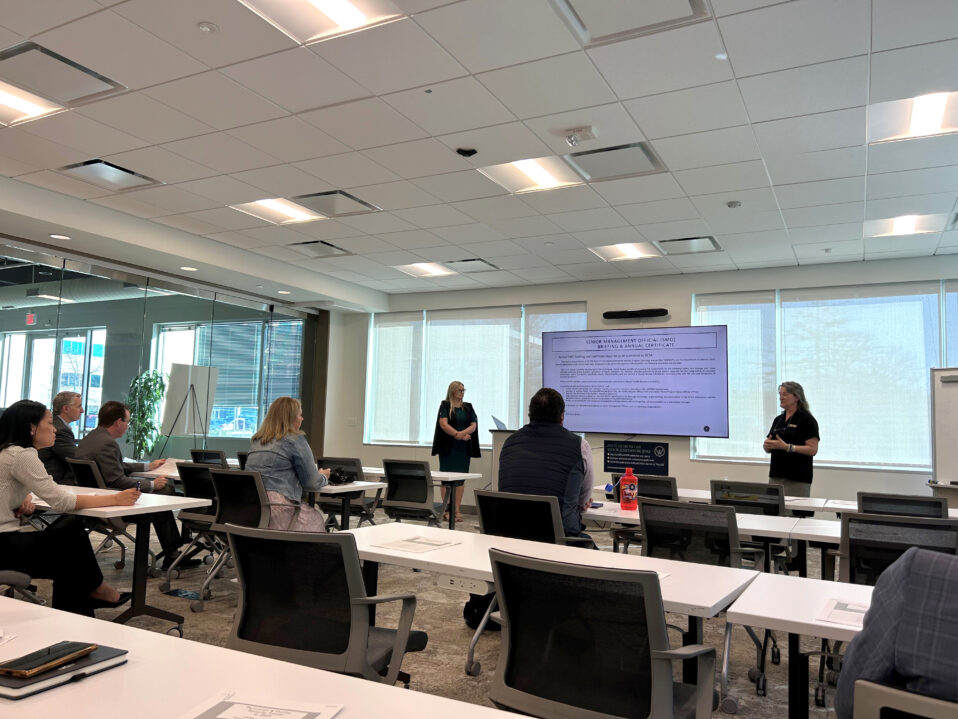
(l to r): Chioma Obi of Anne Arundel Workforce Development Corporation (AAWDC), Minah Woo of Howard Community College (HCC) and Cathy Francois of University of Maryland Global Campus (UMGC) were the guest speakers for the Cyber Pipeline Learning Series Session 1 (of 3).
With all of the constraints faced by small businesses, how do they offer much needed work-based learning experiences for individuals looking to break into the cybersecurity, computer science, and IT fields?
The Fort Meade Alliance recently hosted the first session of the Cyber Pipeline Learning Series featuring three panelists who discussed their own experiences working with businesses to find ways to offer work-based learning to students. The three-part series is a direct result of the FMA’s white paper identifying the Top 5 Challenges in Acquiring CS/IT Talent in the Fort Meade Region and discussions during the subsequent Solving the Cyber Workforce Shortage Forum.
Recognizing the need for solutions, the FMA created this valuable series to learn innovative approaches to tackling the issues at hand.
The first session began with panelists providing brief overviews of their organizations and programs.
Representing Howard Community College (HCC), Minah Woo, Associate Vice President, Continuing Education & Workforce Development, discussed the college’s apprenticeship program, as well as opportunities for industry professionals to vet students prior to offering them other work-based learning experiences.
Chioma Obi, Cybersecurity & IT Talent Consultant for Anne Arundel Workforce Development Corporation (AAWDC) shared ways in which small businesses can take advantage of funding available to sponsor interns and apprentices, as well as AAWDC’s efforts to establish a registered apprenticeship program in cybersecurity.
Finally, Assistant Director of Career Programming for the University of Maryland – Global Campus’ (UMGC) Career Services, Cathy Francois, talked about InternPlus, UMGC’s student internship program, as well as other opportunities for small businesses to leverage UMGC programs to offer work experience to students.
The FMA’s interest in focusing on how to provide work-based learning stems from years of work with partners in the field and the recognition that with more than 19,000 open positions in cybersecurity alone in Maryland, there is an ever-deepening crisis in the workforce.
The panel talked about the conundrum of entry level experience requirements and the hardships businesses face in providing work-based learning opportunities.
Most full-time positions in cyber – even those at the entry level – require one to three years of experience. Without internships, apprenticeships, project-based learning and other creative solutions, there will be no next generation of cyber workers, as no one will be able to develop the experience required to land their first full-time position.
One of the biggest concerns for small businesses has been the issue of security clearances. At HCC, students in the apprenticeship program start the clearance process while front-loading coursework.
“By the time they are cleared, they have a lot of that education under their belt and a hands-on experience in an uncleared space that can be transitioned into the cleared space,” Woo said.
Another major hurdle for small businesses can be paying interns and apprentices. This issue can be alleviated through funding available at the local and state levels, including through AAWDC, Obi said. Furthermore, AAWDC aids businesses and prospective workers by sitting with them to “basically draw up a T-chart of what are the skills they are lacking and what are the skills that they need” so expectations are clear up front for both sides.
The changing nature of the entry level workforce and student population has also made things difficult for businesses. “The talent is here, but oftentimes, the programs are so traditionally designed for that traditional college student,” Francois said. With most college students in the country now pursuing their degree along a non-traditional pathway, work-based learning models will need to evolve and become more flexible to allow everyone to participate.
The panel agreed that widening the pipeline requires flexibility and innovation that will allow the non-traditional talent in our region, including transitioning workers and those financing their education through part-time work, to participate. To truly build the pipeline, we must look at “innovative solutions and outside-the-box solutions,” Woo said.
While small businesses face many challenges in offering work-based learning experiences, the reward can also be great.
Both Woo and Francois discussed mentorship as a way to reinvigorate seasoned employees and avoid the loss of knowledge, skill and experience that occurs when individuals retire – also known as “brain-drain.”
“When companies strategically use internships and mentorships as part of their recruiting pipeline, what you do is encourage a brain dump from that highly trained, skilled individual into that future workforce,” Woo said.
Work-based learning can also provide a strong return on investment for businesses who engage interns, apprentices and mentees by lowering the cost of recruitment and increasing retention.
Join the next two sessions of the Cyber Pipeline Learning Series as we hear about the best practices, ongoing challenges and creative solutions to inspiring the next generation of cyber workers and recruiting (and training) a diverse workforce.
For questions about getting involved in HCC’s apprenticeship program, contact Minah Woo (mwoo@howardcc.edu).
For individuals with questions about work-based learning opportunities and for businesses interested in taking advantage of AAWDC’s candidate vetting and funding opportunities, contact Chioma Obi (cobi@aawdc.org).
For those interested in participating in InternPlus or other UMGC programming, contact Cathy Francois (internplus@UMGC.edu).



